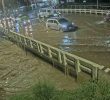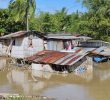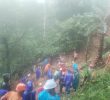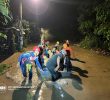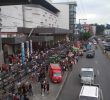“Being men and women for others, our role in helping the typhoon victims should not end in repacking relief goods,” Maureene Villamor, AdDU Student Council President
By IRENE V. DAGUDOG
DavaoToday
DAVAO CITY, Philippines – Students of one of the city’s premier universities have defined their role when it comes to “environmental sustainability and justice.”
The Ateneo de Davao University’s (AdDU) student council Samahan Central Board, created an environmental unit last year to encourage students to actively participate in discussions related to the environment and assistance in times of natural and man-made calamities.
“Being men and women for others, our role in helping the typhoon victims should not end in repacking relief goods,” Maureene Villamor, Samahan President, told davaotoday.com.
More than giving immediate help to the calamity victims, the young leader said, the students should analyze why disasters occur, why lives are lost when it could have been avoided and why there are issues between the government and the typhoon victims.
It can be recalled that Barug Katawhan (People Stand Up), a movement of Pablo victims, staged a barricade at the Montevista Highway in Compostela Valley last January and a three-day campout at the Department of Social Welfare and Development (DSWD) Regional Office in Davao City last February which resulted in the seizure of relief goods at the DSWD.
Samahan’s environment unit called Ecotenista Movement, Villamor said, has helped typhoon Pablo victims and recently held a forum dubbed, “Anong nangyari Pablo? (What happened Pablo?).”
The forum, according to Villamor, is one of the ways to raise the consciousness of her fellow Ateneans on ecological concerns. The Ecotenista Movement, an alliance of progressive student-environmentalists, was tasked to find means to educate the Ateneo community and to develop future environmentally-aware citizens or leaders.
Lawyer Romeo Cabarde, Chairperson of the Community Engagement and Advocacy Council of AdDU, in an interview said that before Pablo struck the Davao region, the university’s role and obligation in times of calamities and humanitarian missions were not clearly defined.
But when Typhoon Pablo came last December, they were challenged to act as an academic institution, adding that “this is a preparation, as an institution, on how we can effectively reach out and help those who are affected by Pablo (and other calamities).”
He said AdDU advances the policy called “I help” or the Integrated Humanitarian Agency Logistics Protocol which aims to coordinate and consolidate efforts on calamities.
Juland Suazo, spokesperson of environmental group Panalipdan and one of the resource speakers during the forum said “it’s a challenge on our architects how they can help design typhoon-proof houses in the affected communities,” given that the structures of houses in these areas were not designed for typhoons or strong winds.
Until now, he added that communities affected by Typhoon Pablo still need food assistance, livelihood and rehabilitation for their shelters.
Cabarde said that their program for the psychosocial therapy of affected children and educational assistance are currently ongoing. (Irene V. Dagudog/davaotoday.com)

